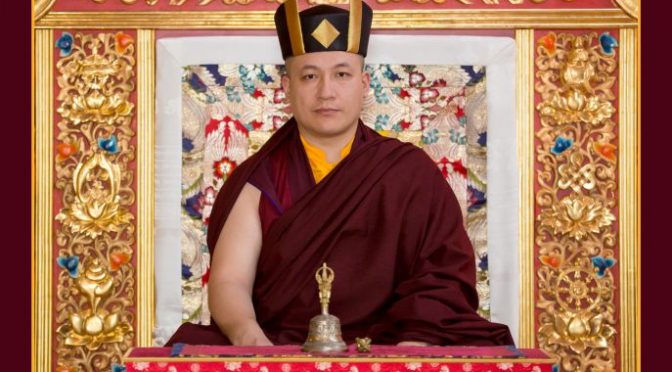第十七世大寶法王嘉華噶瑪巴泰耶多傑,對於他的上師第十四世法王昆津夏瑪仁波切圓寂的開示
10 June 2023
親愛的法友
根據西曆,明天是我們偉大的上師,第十四世法王昆津夏瑪仁波切圓寂九週年。如往年一樣,我們許多人都會用祈禱、點酥油燈、誦經持咒和修習上師瑜伽來紀念這一日。
我一直在思考我們為什麼要紀念大菩薩如夏瑪仁波切他們的圓寂週年日,在此我想與大家分享我的一些想法。
諸佛菩薩不需要別人紀念他們,只是因為我們這些希望能夠覺醒的人去憶記佛菩薩和他們所謂的覺醒。
我們不斷被自己對明日的夢吞噬。
然而,必須要知道佛菩薩並沒有說沒有明天,也沒有說有明天。作爲熱切渴望修行的行者,我們經常感到困惑,認為他們的意思是我們不許做夢。這正是修行的意義所在。
他們如何覺醒在某種程度上比我們想像的要簡單和微妙得多。我們可以做夢,但我們需要明白,沒有醒覺就沒有夢。夢和覺醒是相互聯繫的。
如果我們不強迫去覺醒,那麼夢就會變得諧和。要注意「不強迫」並不代表我們不修行。幾乎可以說的是「我們一定要修行來看看有沒有必要修行」,也就是說通過熱切的修行,我們會認識到修行是一種善巧,讓我們明白到覺醒是不需花力氣的。
不能叫做夢的人不去做夢,但可以給做夢者一種方法,讓他們認識到夢是透過覺醒而結束。故此,他可以很榮幸地說:「哇!是怎樣的一個夢啊!」
所以如果有什麼需要紀念的話,那就是你自己的業力和佛陀的加被,並了解這兩個相互依存的因素產生了做夢和覺醒。
我們可能夢到自己為痛苦的眾生、沮喪的眾生、冷漠的眾生、清醒的眾生、憤怒的眾生或狂喜的眾生,所有這些夢境既不是由於時間也不是由於其他力量。所有這些都是我們自己造就的。而所謂的諸佛就如慈母一樣,已完全包容了我們千差萬別的夢境。而這種完全的包容印證於諸佛菩薩以大悲心再迴入娑婆出現於六道,象徵著他們長住不滅和永不減弱的加持。佛陀既不是法官也非行刑者,你可以看到他們讓有情眾生能自我察覺,最終會因所有這些虛幻的夢而感到無意義。
因此,如果我們「必須」要專注的話,那麼我們就必須專注於夢的本質。沒有醒覺我們能稱它為夢嗎?為什麼我們害怕覺醒?醒來會令我們的身份消失嗎?
當然,佛陀的加持是存在的,如果沒有的話我們就不會做夢了。所以做夢沒有錯,覺醒也沒有錯。做夢與覺醒都是我們的榮幸。
親愛的法友們請謹記好好修行。
致上祈禱
第十七世大寶法王嘉華噶瑪巴泰耶多傑
Thaye Dorje, His Holiness the 17th Gyalwa Karmapa, shares the following message regarding the Parinirvana of his teacher, His Holiness the 14th Kunzig Shamar Rinpoche.
Dear Dharma friends,
Tomorrow marks the 9th anniversary of the Parinirvana of our great teacher, His Holiness the 14th Kunzig Shamar Rinpoche, according to the Western calendar. Like every year, many of us will mark this day by offering prayers, lighting butter lamps, reciting mantras, and accomplishing the practice of Guru Yoga.
I have been giving some thought to why we commemorate the Parinirvana of great Bodhisattvas such as Shamar Rinpoche, and I would like to share some of my thoughts with you:
Buddhas or Bodhisattvas for themselves have no motive to be remembered. It’s only for the sake of those of us who wish to be awakened that we remember them; that we remember their awakened state, so to speak.
We are constantly consumed by our dreams – our dreams of tomorrows.
However, it’s important to know that Buddhas and Bodhisattvas haven’t decreed that there is no tomorrow, nor that there is. We, as fervent practitioners, are often puzzled, believing that they meant to say that we aren’t allowed to dream; that that’s what the practice is about.
But how they have awakened was or is somehow far simpler and subtler than we think. We are allowed to dream – but we need to understand that without awakening there is no dream. Dreams and awakenings go hand in hand.
If we allow awakening by not forcing it, dreaming becomes harmonious. Mind you, ‘not forcing it’ doesn’t mean that we don’t practice. One could almost say, “We must practice to see if we need to practice at all” – meaning that through practicing fervently we come to realise that practice was a method for us to realise that awakening doesn’t require effort.
One can’t teach a dreamer not to dream – yet one can give the dreamer a method to realise that dreams end through awakening. And, therefore, give him the privilege to say, “Wow! What a dream!”
So if anything, commemorate the allowance of yourself (your karma) and the acceptance of the other (Buddha’s blessings), and understand that these two interdependent factors give rise to both dreaming and to awakening.
We may be dreaming as tormented beings, frustrated beings, ignoring beings, sober beings, angry beings, or beings of ecstasy – all of these dream states are neither due to time nor due to some other force. All of them were allowed by none other than ourselves. And the so-called Buddhas have completely accepted our allowance of these various states, like loving mothers. Their complete acceptance is indicated by the depictions in the Wheel of Life, where a Buddha is shown to be present in all the six realms, as a symbol of their ever-present, never-waning blessing.
Buddhas are not judges and executioners, you see – they let sentient beings be, knowing that by themselves they will eventually be bored out of their minds by dreaming all these fantastic dreams.
So if we ‘must’ focus, then we must focus on the nature of our dreams. Can we call it a dream at all without awakening? Why are we afraid of awakening? Will awaking somehow cause our identity to cease?
Surely, the Buddhas’ blessings are present – if they weren’t we wouldn’t be dreaming, so to speak. So there is no fault in dreaming, nor is there a fault in awakening. It’s our privilege to both dream and to awaken.
With that in mind, dear Dharma friends, kindly practice.
With prayers
His Holiness the 17th Gyalwa Karmapa Trinley Thaye Dorje
(中文翻譯由本中心翻譯小組負責。若有錯漏,請見諒。節錄或載列文章內容以原文為準。)

